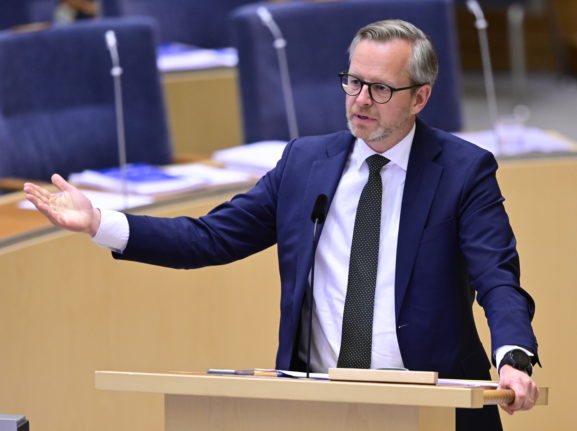Hang on, this is quite complicated.
What’s the background to all this?
Sweden’s finance minister Mikael Damberg announced a so-called “additional amending budget”, or ändringsbudget, on June 15th, to be put before parliament “as soon as possible”. The vote was subsequently scheduled for June 22nd.
The amending budget includes a compromise proposal on pensions agreed on June 13th between the Social Democrats, and the Centre, Green, and Left parties.
“Over the last week, we’ve had intensive meetings with the parties in the pensions group. We didn’t reach our goal, which I regret,” finance minister Mikael Damberg said at the time, as he announced the unusual solution. “This will be, in practice, an adjusted spring budget amendment.”
Åsa Westlund, the Social Democrat chair of the parliament’s finance committee, said that the additional amending budget would be submitted on June 17th, and voted on in parliament on Wednesday June 22nd.
The parliament then voted down both the government and the opposition’s spring budget (with the Social Democrats taking the unusual measure of abstaining on their own proposal).
This meant no budget was passed.
What is an amending budget?
According to parliamentary rules, Sweden’s government can propose an amending budget twice a year, normally in the spring or the autumn.
“Amendments to the central government budget may only be submitted on other occasions if the Government considers that there are special grounds for doing so,” the rules state.
In exceptional circumstances, though, so-called “additional amending budgets” can be submitted.
This happened on several occasions during the Covid-19 pandemic, but it is very unusual to use an additional amending budget to replace an entire spring budget that has been submitted only days before (which is what has now happened).
What’s the background?
As part of the deal the Social Democrats struck with the Left Party in return for them letting Magdalena Andersson get voted in as prime minister by parliament in November, the Social Democrats agreed to increase the amount people on a so-called “guarantee pension” will receive, with a special ‘guarantee bonus’.
The guarantee pension is for those who have had low or no income throughout their lives.
When the proposal for the new bonus was launched in April, it was criticised by the pensions authority for its bureaucratic complexity, and by other parties — particularly the Centre Party — for bypassing the cross-party pensions group, which has for more than a decade succeeded in stopping pensions becoming a political issue.
The opposition Moderate, Christian Democrats and Sweden Democrats party at the start of May launched an alternative proposal, which they said claimed would give increased payments to more pensioners.
The government continued seeking to agree a compromise proposal within the pensions group, which includes all the parties in parliament except for the Sweden Democrats, the Green Party and the Left Party, but the opposition parties rejected its proposal at the end of May.
The government then on Monday agreed a compromise proposal with the Centre Party, Green Party and Left Party, which would see the guarantee pension increased.
The opposition parties then blocked this compromise proposal on technical grounds, arguing that, even though it has the support of a majority of MPs, it had been agreed with too little time left before the budget was due to go before parliament on June 15th.
Why can’t the government put its pensions compromise before parliament?
Even though the parties that back the pensions compromise have a majority of one in parliament, the right-wing opposition has a majority of MPs in the parliament’s finance committee, which formally submits budget proposals, including pensions, to the parliament.
This gave them the power, to the irritation of the government, to vote not to submit the proposal to parliament, something Sweden’s welfare minister, Ardalan Shekarabi, complained had never happened before.
“What we are seeing is a minority in the parliament not even letting the proposal be put before the chamber, where there is probably a majority in favour of it,” he said on June 13th prior to the first budget vote.
“This is not good for Swedish democracy,” said Martin Ådahl, the Centre Party’s finance spokesperson.
How did the opposition justify blocking the compromise?
The Christian Democrats and Moderates justified blocking the proposal on technical grounds.
“With just a few minutes left before the meeting of the finance committee, a new proposal was presented which had not had enough time to be prepared in the right way,” Jakob Forssmed, from the Christian Democrats told SVT.
“For that reason we are not going going to submit it, but will instead submit our proposals, and that is good for Swedish pensioners.”
Oscar Sjöstedt, the Sweden Democrats’ finance spokesperson, said that whereas the government’s proposal had come at the last minute, the opposition’s had been negotiated over weeks. “This is a better proposal which will benefit all pensioners,” he said.
The opposition has since characterised the compromise proposal as a half-finished document, written on half a side of A4.
What’s at stake politically?
If the government fails to pass yet another budget and the opposition’s pensions proposal goes through, it will look weak, allowing the opposition parties to argue that they are in the best position to provide stable government after the election.
The government also needs to be seen to fight hard to fulfil its side of the deal it made with the Left Party in November. If it allows the compromise to fall without a struggle, it might make it more difficult to win the former Communist party’s backing for a Social Democrat-led government after the election.
Even the government does pass the budget next week, though, it still looks weak.
Elisabeth Svantesson, the Moderate Party’s finance spokesperson, is already accusing it of turning Sweden into a “banana republic” by using unorthodox means to get its proposal through.
What’s the difference between the three pension proposals?
The original proposal agreed with the Left Party was a pensions bonus of up to 1000 kronor, which would have gone to about a million of the poorest pensioners.
The right-wing bloc’s alternative was slightly more costly for the government, so in some senses more generous, but spread more widely among pensioners, with even the richest sharing in a pensions tax reduction. The right-wing proposal also included a smaller increase in the existing pension, and an increase in housing allowance for the poorest.
The compromise agreed with the Centre Party would see the guarantee pension increased by 1,000 kronor a month, but within the existing pensions system.
“It’s better from a long-term perspective to not add new components,” Johannes Hagen, Assistant Professor in Economics at Jönköping International Business School, told The Local of the compromise. “But the other parties in the pension group don’t support this, so right now it’s unclear whether it will go up for a vote in the parliament.”
What’s at stake for pensioners?
Whoever wins, they will get more money. The question is how many of them actually need it.
A report published by the Swedish Fiscal Policy Council this year found that the incomes of pensioners have actually improved in comparison to those of the working age population. Sweden has the lowest absolute poverty — defined as the ability to buy basic goods — among the elderly in the whole of Europe. And the relative poverty of pensioners — the number who have an income 60 percent of average — is about average for the European Union (although higher than in other Nordic countries).
“The way the debate is playing out now is clearly election-oriented, and it’s a political game which hasn’t been seen before in the pension arena, with this cross-bloc pension group,” Hagen said.
Since the pension group was set up in 2009, Sweden’s pension system has been managed in a non-political, predictable and stable way.
“People are worried that this is going to be the situation in the next election too — that if you can’t get a majority in the pension group, you just circumvent it and do deals with the Left Party or the Sweden Democrats,” he said.
“It’s a problem for the pension system if there are going to be short-term changes before each election. The way the debate has developed in the last month is a bit worrying.”
What happens next?
As so often seems to be the case in Sweden’s current chaotic parliamentary situation, it’s far from certain.
Whether the additional amending budget the government wants to submit today will pass, as with the no-confidence vote in Morgan Johansson earlier in June, and the voting in of Magdalena Andersson as prime minister in November, comes down to the independent MP Amineh Kakabaveh.
On June 15th she announced that she wouldn’t vote for the budget unless the Social Democrats pledged not to allow weapons sales to Turkey, which would prevent it meeting one of Turkey’s key demands for backing Swedish Nato membership.
On June 22nd, just hours before the vote, she announced that she hadn’t yet made up her mind. If the vote is a tie, it will be decided by drawing lots, meaning there will be a 50/50 chance of the government’s or the opposition’s budget being passed.
Can Kakabaveh be persuaded to back down? Is the government ready to kick its Nato application into touch until after the election?
Today, we’ll find out.



 Please whitelist us to continue reading.
Please whitelist us to continue reading.
Member comments